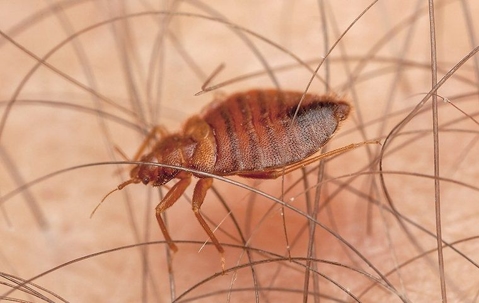Finest Kings Bug Control Cincinnati: Premier Pest Control Experts
Finest Kings Bug Control Cincinnati: Premier Pest Control Experts
Blog Article
Kinds Of Insect Control: Which Method Is Right for Your Problem?
When faced with a parasite invasion, the choice of a proper technique for bug control is vital in properly taking care of the circumstance. From chemical treatments to biological services, there exists a variety of techniques that can be utilized to attend to different sorts of bugs. Each technique features its very own collection of advantages and considerations, making the decision-making procedure a nuanced one. Understanding the nuances of each strategy and examining their compatibility with the certain bug invasion at hand is important for achieving long-term success in parasite monitoring. By exploring the various types of parasite control approaches available, individuals can make enlightened decisions customized to their distinct situations, ensuring a much more effective and sustainable outcome in insect removal.
Chemical Bug Control
Chemical insect control involves using synthetic or naturally obtained chemicals to take care of and eliminate pest populaces efficiently. This method is generally made use of in agriculture, forestry, and residential settings to deal with a large array of bugs, consisting of insects, rodents, and weeds. The use of chemical pesticides can supply fast and targeted services to pest invasions, making it a popular option for numerous individuals and companies.
Among the vital advantages of chemical insect control is its ability to promptly eliminate bugs, decreasing the danger of damage to crops, property, and human health and wellness. By utilizing details chemicals that target particular insects, this approach can efficiently regulate problems while lessening injury to advantageous microorganisms and the setting when applied properly.
However, the use of chemical pest control likewise elevates problems regarding prospective damaging impacts on non-target types, water resources, and human wellness. It is important to follow safety and security guidelines, apply chemicals properly, and consider different parasite control approaches to lessen these risks and guarantee lasting insect monitoring practices.
Biological Pest Control
Biological bug control, also referred to as biocontrol, uses living microorganisms to reduce and manage parasite populations normally. This method uses the power of nature to control bugs without the requirement for artificial chemicals. Biocontrol can involve the intro of all-natural enemies of the bug varieties, such as virus, parasites, or killers, to suppress parasite populaces. By making use of the pest's all-natural killers or pathogens, organic bug control uses a eco-friendly and lasting option to pest monitoring.

Mechanical Insect Control
Making use of physical and hands-on approaches to handle parasite populaces, mechanical parasite control offers an alternate approach that does not rely upon making use of living microorganisms or synthetic chemicals. This technique includes making use of barriers, catches, or various other tools to literally prevent or eliminate pests. By obstructing pest entry points or establishing traps to capture them, mechanical bug control can effectively decrease invasions without presenting chemicals right into the atmosphere.
One usual instance of mechanical bug control is using mesh displays on windows and doors to stop insects from getting in structures. This straightforward yet resource efficient approach serves as a physical obstacle, maintaining insects out while permitting appropriate ventilation. In addition, gadgets like mousetraps, fly swatters, and ultrasonic repellents drop under the mechanical pest control group.
While mechanical pest control techniques can be labor-intensive and call for routine surveillance and upkeep, they provide a eco pleasant and lasting remedy for managing pest problems. By integrating different mechanical strategies, homeowner can create a detailed bug control strategy that reduces dependence on chemical pesticides.
Physical Pest Control

Some typical physical parasite control methods consist of the usage of barriers such as webs or displays to avoid parasite entry, catches to record and eliminate insects, and hand-picking to physically remove insects from plants or frameworks. Additionally, strategies like warmth therapies can be used to control parasites like bed pests by raising the temperature level to degrees that are dangerous to the insects.
Physical insect control is especially beneficial in incorporated insect management (IPM) methods, where numerous parasite control approaches are incorporated for efficient insect monitoring while minimizing using chemicals. By making use of physical insect control strategies, people can properly attend to pest invasions with marginal environmental impact.
Integrated Insect Management
When implementing physical parasite control approaches as part of bug monitoring approaches, Integrated Parasite Administration (IPM) becomes an extensive technique that leverages different techniques to efficiently manage pest populaces. IPM concentrates on long-lasting prevention of bugs via a combination of biological, cultural, physical, and chemical tools customized to particular parasite issues. By integrating multiple control methods, IPM aims to reduce the risks associated with bugs while additionally decreasing dependence on chemical remedies.
One trick element of IPM is the focus on tracking and examining pest populations to determine the most appropriate control techniques. This proactive strategy enables very early treatment and targeted methods, bring about much more reliable bug management. Additionally, IPM advertises eco pop over to these guys friendly practices by prioritizing non-chemical control techniques and only using chemicals as a last option.
Final Thought

By using the bug's all-natural predators or pathogens, biological insect control provides a eco pleasant and lasting option to pest management. - Kings pest control Cincinnati Ohio
Utilizing physical and manual techniques to take care of insect populaces, mechanical parasite control supplies a different method that does not depend on the use of living organisms or artificial chemicals.An efficient technique to handling bug populations without relying on chemical or biological techniques involves the usage of physical pest control techniques.When carrying out physical bug control methods as part of insect management approaches, Integrated Parasite Monitoring (IPM) emerges as a thorough approach that leverages different strategies to effectively control pest populations. Chemical insect control involves the use of pesticides, biological parasite control makes use of all-natural killers, mechanical insect control involves physical barriers, physical bug control includes trapping or removing parasites, and incorporated insect management incorporates several methods for a holistic approach to pest control.
Report this page